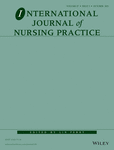Journal list menu
Export Citations
Download PDFs
ISSUE INFORMATION
LITERATURE REVIEWS
COVID-19 and pregnancy: A scoping review on pregnancy characteristics and outcomes
- First Published: 16 May 2021
ORIGINAL RESEARCH PAPERS
Exploring experiences of COVID-19-positive individuals from social media posts
- First Published: 14 June 2021
Spiritual care, compassion and associated factors of midwives working in delivery rooms
- First Published: 03 June 2021
The effect of parental participation in the care of hospitalized children on parent satisfaction and parent and child anxiety: Randomized controlled trial
- First Published: 16 December 2020
What is already known about this topic?
- Child hospitalization is a stressful experience for both children and their families.
- Physical impairment, invasive interventions, surgery, death, pain and experiencing loss of control are among the reasons that children feel anxious in the hospital environment.
- Parental participation is an essential element of quality of care for children in hospital. However, there is often confusion in role perception between parents and nurses which may be affected by nurses' attitudes, their ability to provide information, their communication and interpersonal skills and willingness to relinquish control.
What this paper adds?
- Parental participation in the care of hospitalized children increases parent satisfaction with healthcare, and reduces anxiety of both parents and children.
- Nurses confirmed the belief that parents' participation in the child's care is an important part of nursing in paediatric care and suggested that the nurses should play the role of being the communicator with the parents.
- The study indicates that there is a need for hospital management to develop clinical routines and staff guidelines for parental involvement in paediatric care.
The implications of this paper:
- Nurses need to be aware of the impact their communication has on parents and help them to clarify their role as parents in hospital.
- For clinical practice, checklists and staff guidelines could be useful tools in arriving at an understanding of how to work with children's parents. One of the biggest challenges that lies ahead is to get hospital staff to strive toward a better understanding and attitude toward parental participation.
- Parents' participation is very important for nurses, children and families in adapting to hospitalization, but still, parents' participation is not at the desired level.
Effects of two different positions on stress, pain and feeding tolerance of preterm infants during tube feeding
- First Published: 09 December 2020
What is already known about this topic?
- Tube feeding, one of the ways of giving the nutrients that premature infants need, is a stressful and painful nursing intervention.
- One of the complications with tube feeding of premature infants is feeding intolerance, which is an important and serious problem.
What this paper adds?
- The result of this randomized cross-over clinical trial provides evidence that semi-elevated right lateral position is effective in reducing pain and stress levels of premature infants during tube feeding.
- Semi-elevated right lateral position during tube feeding is effective to increase the feeding tolerance of premature infants.
The implications of this paper:
- This study contributes to the literature on positioning methods to manage stress and pain associated with tube feeding and increase feeding tolerance in premature infants.
- Nurses should be aware that tube feeding is a stressful practice for infants and should take interventions to reduce stress. During tube feeding, semi-elevated right lateral position is an effective nursing intervention to reduce stress and pain and increase feeding tolerance.
Broaching overweight and obesity at maternity and child health clinics
- First Published: 12 May 2021
Counselling and education for prenatal screening and diagnostic tests for pregnant women: Randomized controlled trial
- First Published: 09 August 2021
Anxiety, depression and social support across pregnancy in women with a history of recurrent miscarriage: A prospective study
- First Published: 02 August 2021
Effectiveness of health literacy education for nursing students: A randomized controlled trial
- First Published: 01 June 2021
RESEARCH METHODOLOGY PAPER
Validity and reliability of the Indonesian version of the Pittsburgh Sleep Quality Index in adolescents
- First Published: 07 July 2020
What is already known about this topic?
- The original Pittsburgh Sleep Quality Index has adequate internal consistency and favourable reliability.
- It is easy for patients and health-care providers to use for interpreting sleep disturbances.
What this paper adds?
- The results support the validity and reliability of the Pittsburgh Sleep Quality Index-Indonesia in screening sleep quality among adolescents.
- The cutoff score for the Pittsburgh Sleep Quality Index-Indonesian version for adolescents was 6.5.
The implications of this paper:
- The cut-off point could detect poor sleep quality among Indonesian adolescents.
- This simple tool is capable of quickly assessing sleep quality for health-care providers.




